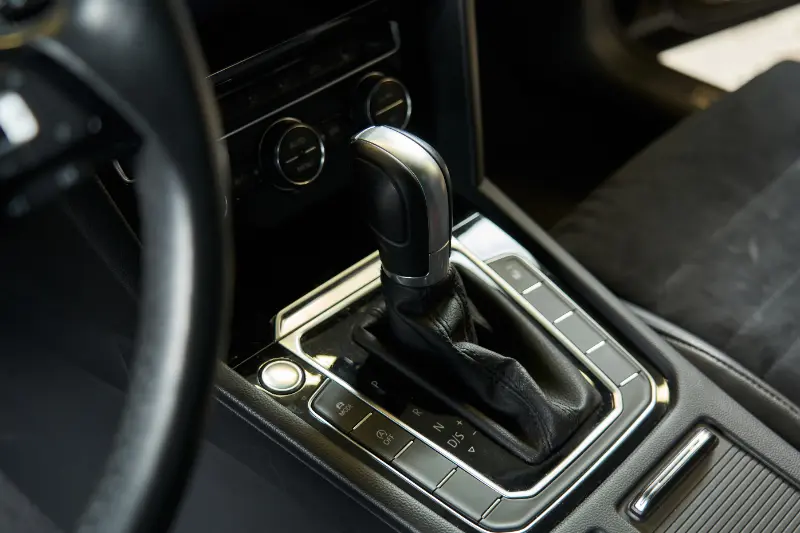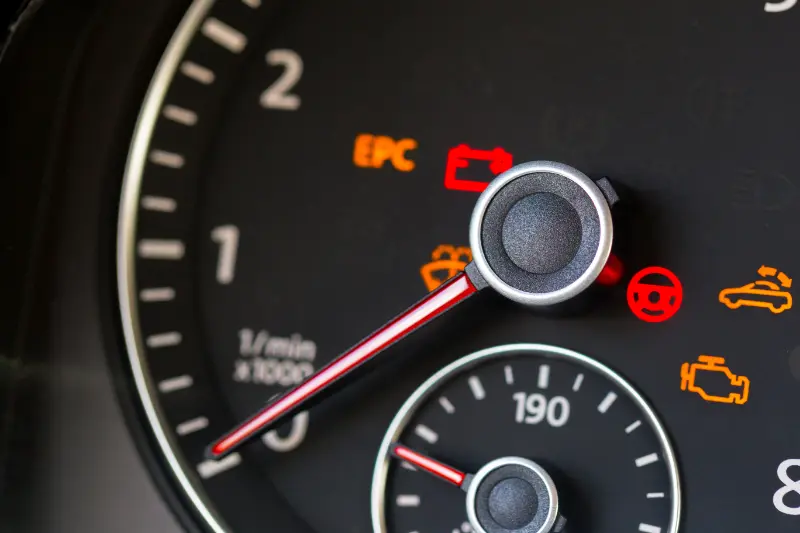The automotive industry is constantly evolving, and one of the most significant innovations in recent years is the Direct Shift Gearbox or DSG.
This game-changing gearbox promised drivers the convenience of an automatic gearbox while providing the agility of a manual.
In this article, we’ll take you on a journey through the mechanics of the DSG transmission, comparing historical and modern variants and offering our professional advice on maintaining and maximising its potential.
We’ll explore the technical world of DSG gearboxes and provide you with the knowledge you need to keep your car running smoothly.
So, whether you’re a seasoned driver or a curious enthusiast, join us as we dive into the world of DSG gearboxes and uncover the secrets to maximising their potential.

What is the DSG Gearbox?
The Direct Shift Gearbox is a type of automatic transmission that combines the benefits of a manual gearbox with the convenience of an automatic. Known for their fast and smooth gear changes, DSG gearboxes have become a popular choice for drivers seeking a sporty driving experience.
The DSG gearbox revolutionised the automatic transmission experience. It combines the convenience of an automatic with the sporty feel and fast shifts of a manual. This innovative technology has been widely adopted by several manufacturers, including Volkswagen, Skoda, and SEAT, and is available in a range of vehicles, from small city cars to high-performance sports cars.
This is achieved through its unique design with two separate clutches for even and odd gears, enabling lightning-fast gear changes without power loss.
A dual clutch transmission, like the DSG, uses two clutches to manage gear shifts more efficiently. DSG, developed in the early 2000s, primarily by Volkswagen, marked a significant leap in automatic transmission technology.
It offered drivers the instantaneous power delivery they craved and improved fuel efficiency, exceeding expectations for conventional automatics.
Is DSG Gearbox Reliable?
The DSG Gearbox has been integrated into a wide array of vehicles. Its dual-clutch design facilitates quick and smooth gear changes, enhancing the driving experience and fuel efficiency. However, the reliability of the DSG gearbox can vary depending on the model and its maintenance history. One of the standout features of DSG gearboxes is their ability to offer improved fuel economy and reduced emissions compared to traditional automatic gearboxes. This makes them an attractive option for environmentally conscious drivers..
Regular DSG oil changes are essential to maintain its performance. Generally, wet-clutch variants (e.g., DQ250) are considered more reliable, especially those designed for higher torque engines. Mileage is also a significant factor in determining the reliability of a used DSG-equipped vehicle.
Nevertheless, the initial rollout of DSG technology, particularly the pre-2012 DQ200 version with dry clutches, faced some reliability concerns. Drivers reported issues like sudden power loss and overheating. It’s important to note that these concerns were not necessarily representative of the entire DSG technology but specific to this early dry-clutch version.
One significant factor influencing the DQ200’s reliability was proper maintenance. Regular oil changes and software updates were crucial for its smooth operation and longevity. Failures, although rare, were more common in older, higher-mileage vehicles and could be costly to repair. Later, DSG models with wet clutches addressed these concerns and generally exhibited improved reliability. Prioritising vehicles with a comprehensive service history, ideally maintained by qualified professionals, is recommended to mitigate potential issues.
Wet vs. Dry: DSG Gearbox Variants and Their Performance
The wet clutch DSGs, equipped with two clutches, are celebrated for their reliability and capability of handling higher torque levels, which provides a smoother driving experience. This makes them particularly suited for more powerful vehicles, and they are known to perform well even under demanding conditions, offering durability.
On the other hand, dry clutch DSGs are recognised for being lighter and providing slightly better fuel economy. However, they may encounter reliability issues, notably in earlier models such as the DQ200.
DSG gearboxes can be driven seamlessly like conventional automatic transmissions, although the driving experience may differ, particularly in gear shifting behaviours and characteristics, especially in situations like hill starts or traffic.
Choosing the right variant depends on your needs and driving habits. A wet clutch DSG might be the better option if you prioritise performance, durability, and smooth shifting. If fuel economy and weight are your primary concerns, a dry clutch DSG could be suitable, but consider potential reliability concerns, especially in older models.
Comparison of DSG Gearboxes with Automatic Gearboxes
DSG gearboxes are often compared to traditional automatic gearboxes, which use a torque converter to provide smooth gear changes. However, DSG gearboxes offer several advantages over traditional automatics, including improved fuel economy and faster gear changes.
One of the key benefits of DSG gearboxes is their ability to provide a more engaging driving experience. With a more direct connection to the engine and gearbox, drivers can enjoy a sportier feel and more responsive performance. In contrast, traditional automatics can sometimes feel less responsive and less engaging when driving.
Efficiency is another area where DSG gearboxes excel. They are designed to be more efficient than traditional automatics, offering improved fuel economy and reduced emissions. This makes them a great choice for drivers who want to save on fuel costs and reduce their environmental impact.
However, traditional automatics do have their advantages. They are often smoother and more comfortable to drive, especially in heavy traffic or stop-and-go driving conditions. This makes them a good option for drivers who prioritise comfort and convenience over sporty performance.
Ultimately, the choice between a DSG gearbox and a traditional automatic comes down to personal preference and driving style. DSG gearboxes are ideal for drivers who want a sporty driving experience and improved fuel economy, while traditional automatics are better suited for those who value comfort and ease of use.
Warning Signs of a Troubled DSG Gearbox
Early detection of potential issues with your DSG gearbox can save you from costly repairs. If you notice any of the signs we will discuss below, addressing them promptly can prevent more severe damage and reduce the need for expensive repairs.
Shifting Performance
A key indicator of a DSG gearbox issue is the performance during gear changes, specifically how the system is designed to automatically change gear without driver intervention. This can manifest as hesitation or jerkiness, particularly noticeable when accelerating or decelerating, and rough or abrupt gear changes rather than the expected smooth transition.
Additionally, slipping gears, where the engine’s revs climb without a corresponding increase in speed, signal a disconnect in the transmission’s operation.
Unusual Noises
Sounds that are out of the ordinary, such as grinding or whining during gear changes or general driving and clunking noises when gears engage or the vehicle stops, indicate that something is amiss with the gearbox.
These unusual noises can be signs of various faults, including issues with the mechatronic unit or clutch problems, which are reliability concerns for car buyers.
Dashboard Indicators
The appearance of warning lights on the dashboard, specifically those related to the engine or transmission, along with error messages concerning transmission faults, can often preclude deeper issues within the DSG system.

Other Symptoms
Additional symptoms include a noticeable burning smell, which may indicate overheating of transmission fluid, difficulty engaging gears, and decreased fuel efficiency.
At low speeds, DSG gearboxes can struggle with smooth operation, often due to issues with clutches and the mechatronic unit. These signs suggest that the gearbox is not operating as efficiently as it should be.
Taking action upon noticing these symptoms is critical to prevent severe damage to your vehicle.
Ivydene Garage Ltd.: Ashford’s Premier Bosch Car Service Centre for First-Class Care
When it comes to precision, trust, and experience, Ivydene Garage Ltd. leads the way. As a family-run business with over 32 years of experience and official Bosch recognition, we’ve built our reputation as Ashford’s go-to garage for reliable repairs and diagnostics.
We invest heavily in cutting-edge diagnostic tools and manufacturer-level service procedures, ensuring your vehicle gets nothing short of expert attention.
Why drivers across Ashford choose Ivydene Garage Ltd.:
- Over 32 years as Bosch-certified agents
- Expert diagnostics and repairs for most makes and models
- Specialists in DSG servicing, oil changes, and diagnostics
- Fully equipped for light commercial vehicles
- Friendly, honest service from highly trained technicians
From DSG gearbox diagnostics to full vehicle servicing, we go beyond standard garage service. You’ll receive transparent quotes, timely service, and quality you can count on every time.
Located in the heart of Ashford, our workshop is conveniently placed at Unit 99 Ellingham Industrial Estate, and we are always ready to help with quick bookings and professional guidance.
Common DSG Gearbox Challenges with Heavy Loads
DSG gearboxes, known for their smooth shifting and efficiency, can be excellent companions for everyday driving. However, pushing them beyond their designed limits can lead to challenges, like any mechanical system.
When consistently carrying or towing heavy loads, the DSG experiences higher stress on its clutches and other components. This can accelerate wear, potentially leading to issues like clutch slippage or overheating in extreme cases. Using paddles for manual shifting can help manage gear changes more effectively under such conditions.
However, since DSGs come in various configurations with different torque capacities, selecting a variant suited to your typical driving needs and load expectations is crucial. Opting for a higher-rated variant for frequent heavy use can provide added peace of mind regarding DSG reliability.
To keep your DSG gearbox performing well and lasting longer, always stick to weight limits and prioritise proper maintenance. Regular servicing and oil changes using manufacturer-recommended fluids are essential. Avoid aggressive driving, such as hard acceleration and frequent full-throttle shifts, especially when carrying heavy loads, to reduce stress on the gearbox.
Understanding DSG Gearbox Sounds
A quiet hum often accompanies the smooth operation of a DSG gearbox. However, unusual noises can arise, prompting concern among drivers. While not every sound indicates immediate trouble, learning their potential meanings can be empowering.
Grinding Noises
These sounds, especially during gear changes, often suggest clutch wear or a need for recalibration of the mechatronic unit.
Some models have been tuned for higher power and torque without experiencing reliability issues, highlighting the robustness of the DSG system when properly maintained.
Ignoring these signs could lead to more severe problems, as worn-out clutch packs in a DSG transmission can result in shuddering or juddering when accelerating and slipping between gears. The solution typically involves replacing the entire clutch pack assembly with a skilled mechanic to avoid premature wear in the future.
Whining Sounds
A high-pitched whine, particularly at higher speeds, could indicate bearing wear within the gearbox. Bearings don’t commonly wear out in DSG transmissions, but if they do, the replacement is a complex task that often leads to installing new or rebuilt transmissions instead of bearing replacement.
Clunking Sounds
Clunking, especially when shifting into gear or coming to a stop, might be due to worn internal components or loose mountings. This type of noise can often indicate a fault within the transmission system. Sometimes, VW technicians consider clunking noises normal to a certain extent, especially when downshifting.
However, when accompanied by jerking or thudding, it’s a sign of a more significant concern. Solutions vary from inspecting and replacing gearbox mounts to changing transmission fluid or updating the gearbox software.
Slipping Gears
If the engine revs increase without a corresponding increase in vehicle speed, this could signify clutch slippage, often under heavy load, indicating potential clutch wear or even clutch failure. This situation usually requires replacing clutch packs to solve the issue.
Start-Up Struggles: Addressing DSG Gearbox Issues from Ignition
The moment of ignition can reveal much about the health of a DSG transmission. For those using their car as a daily driver, any stutter or hesitation as you set off may indicate the need for a DSG health check. Such early detection can be pivotal in preventing the domino effect of transmission problems. A robust DSG service plan ensures such issues are noted and addressed swiftly, guaranteeing a reliable start every time.
Secure Longevity For Your DSG Gearboxes With Regular Maintenance
DSG gearboxes offer exceptional performance, but their longevity hinges on specialised care, particularly the regular maintenance of DSG oil. Regular maintenance is crucial, focusing on clutch health and transmission fluid quality. Choosing a qualified mechanic with expertise in DSG systems and access to advanced diagnostics ensures proper care and early problem detection.
Regular oil changes, typically every 40,000 miles, are essential to maintain the reliability and performance of your DSG gearbox.
Proactive DSG ownership starts with adhering to the manufacturer’s maintenance schedule and being attentive to potential warning signs. Selecting a reputable service provider with expertise in DSG gearboxes, like Ivydene Garage Ltd., guarantees your DSG receives the specialised attention it deserves, translating to confidence and enjoyment on the road.
Frequently Asked Questions
What does DSG stand for, and how is it different from other gearboxes?
DSG stands for direct shift gearbox, which actually combines two gearboxes in one housing to allow quicker gear changes than a traditional single gearbox.
Can I test drive a car with a DSG before buying?
Yes, most dealerships will let you test drive a car with a DSG to experience its smooth shifting and performance firsthand.
Does launch control work differently in a DSG box?
Yes, launch control in DSG boxes provides rapid acceleration by pre-selecting the next gear, making it faster and more controlled than in standard automatics.
Have there been any DSG recalls I should know about?
Some models with DSG boxes have had recalls in the past—check your VIN and the manufacturer’s site to be sure your car isn’t affected.
Conclusion
With its unique blend of automatic ease and manual precision, the DSG gearbox is a marvel of modern engineering, but not without its need for attentive care. DSG gearbox problems, particularly with early versions like the dry clutch 7-speed, are known for reliability concerns, while later models, especially wet clutch variants, have significantly improved in terms of durability when maintained properly.
Understanding the distinctions between models and recognising the telltale signs of wear are key to maintaining its peak performance.
If you desire a hassle-free DSG experience, the support of seasoned experts is invaluable. , with over 32 years of service excellence, stands ready to address all your DSG needs, ensuring you enjoy a reliable and dynamic driving experience.
Contact us today for an appointment and shift your gear worries into assurance, including any necessary repairs.
